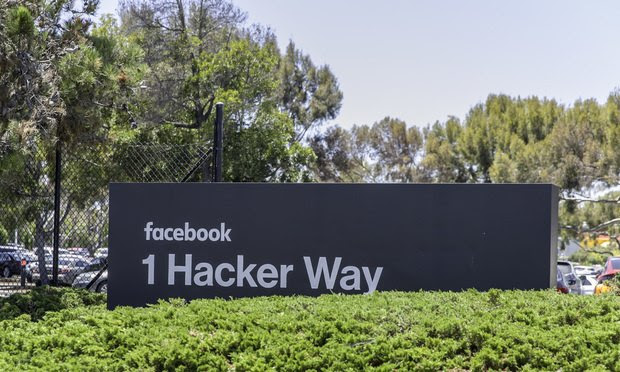Critical Mass: Here Come the Facebook Data Breach Lawsuits
Also this week, Apple Defense Sours in Throttling Cases.
October 03, 2018 at 12:15 PM
6 minute read
Welcome to Critical Mass, Law.com's weekly briefing on class actions and mass torts. This week: Facebook announced a data breach, and got hit with a lawsuit the same day. Plus, a judge sliced Apple's throttling defenses. And what did plaintiffs lawyers argue to support the $289M Roundup verdict against Monsanto?
Send your feedback to [email protected], or find me on Twitter: @abronstadlaw.
➤➤ Would you like to receive Critical Mass as an email? Sign up here.
Facebook's Breach: More Lawsuits?
In one of the few news stories to compete with the potential nomination of U.S. Supreme Court nominee Brett Kavanaugh for the spotlight, Facebook announced on Friday that about 50 million of its users had been hacked. And, on the same day, Morgan & Morgan and Clayeo C. Arnold filed the first class action over the breach (here's Law.com's Ross Todd with the complaint).
According to this story by my colleague Zach Warren, Facebook officials claimed they discovered the breach three days earlier. Hackers used a feature called “View As,” which allows users to see what their own profile looks like to someone else. Facebook VP Guy Rosen explained that the feature allowed hackers to steal “access tokens” to take over people's accounts. “Access tokens are the equivalent of digital keys that keep people logged in to Facebook so they don't need to re-enter their password every time they use the app,” he said.
I checked in with Eric Gibbs (Gibbs Law Group), who has handled some of the biggest data breach cases, to get his thoughts on Facebook's fiasco. He told me the news is a “familiar pattern” with a new twist.
“What's new is that the breach isn't just impacting Facebook accounts, but potentially hundreds of linked accounts too. In these types of situations, we often learn that the initial breach announcement comes in low and is later revised voluntarily or it is revealed during discovery. Given the gravity of early reports, it's not surprising to me that consumers will seek to protect themselves through class suits. And this presents quite an interesting intersection of evolving technology, privacy concerns, and the law; therefore, I expect there will be a lot of interest in the case.”
Getting to the Core
Apple took its first bite at class actions alleging it purposely slowed processing speeds on iPhones — and a judge gave it much to chew on.
Here's my colleague Ross Todd's preview of the Sept. 28 hearing, where Apple argued that iPhone customers had authorized software installations to prevent unexpected shutdowns, the consequence of which was decreased performance. Apple attorney Christopher Chorba (Gibson Dunn) also tried to limit the litigation to U.S. consumers.
On Monday, U.S. District Judge Edward Davila disagreed, allowing the throttling claims to go forward — a big win for plaintiffs, repped by Joseph Cotchett(Cotchett, Pitre & McCarthy) and Laurence King (Kaplan Fox). But Davila had concerns about some of the other claims. Ross told me:
“The plaintiffs attorneys didn't lay out which plaintiffs were allegedly deceived by what Apple statements regarding battery life and phone performance. But it seemed his bigger problem was that the plaintiffs' theory that the phones were defective out of the box collapsed under its own weight. Davila said that the consumer claims appeared to him to be an end-run around bringing warranty-related claims — a no-go in this instance since Apple's hardware warranty expressly exempts consumable parts like the batteries from coverage.”
Maintaining the Monsanto Verdict
Lawyers who won a $289 million Roundup verdict filed court papers on Mondayopposing Monsanto's post-trial motions to toss out the award. Lawyers for plaintiff Dewayne “Lee” Johnson opposed Monsanto's motion for judgment notwithstanding the verdict, and responded to its motion for new trial. Monsanto filed both motions last month (my story here), insisting there was no evidence that its herbicide caused non-Hodgkin lymphoma.
But plaintiffs lawyers, in their motions, insisted the evidence was there and supported an award rendered by “highly educated, sophisticated, and impartial jurors.” Michael Baum (Baum Hedlund), referring to San Francisco Superior Court judges Curtis Karnow and Suzanne Bolanos, issued this statement about the filings:
“This opposition refutes the arguments and issues already addressed and rejected by Judges Bolanos and Karnow, and with this highly educated, attentive jury's verdict, we believe there is no basis for changing the outcome.”
Legal Ads More Prevalent Than…Pizza?
The American Tort Reform Association (which kicked off its “Lawsuit Abuse Awareness Week” on Monday) came out with a report last week that said lawyers spent $186 Million on TV advertising in the second quarter of 2018. The report found that 3 million ads ran in 210 local media markets, “often urging consumers to join a class action lawsuit,” according to ATRA's press release. The report even lists the seven media markets that were the most popular and how legal ads stacked up against those for pizza and restaurants.
The report got me thinking: Why are these TV ads so important to the plaintiffs' bar? I asked Andy Birchfield (Beasley Allen), who told me:
“In many cases, advertising by attorneys represents the only way that consumers can learn about unsafe products and threats to their safety and welfare. Trial lawyers are often called on to be advocates for the public by asking the questions, performing the investigations, and alerting legislators and government regulators. Without the ability to reach consumers through advertising, a long list of dangerous and improperly labeled products would likely remain on the market.”
And here's a bit more news for the week:
SCOTUS Preview: Brett Kavanaugh might not have been nominated, but the U.S. Supreme Court is moving forward with cases. Law.com previewed six cases to watch this term, including Frank v. Gaos, which challenges cy pres funds in class action settlements. The Supreme Court also agreed last week to hear Home Depot USA v. Jackson, which has to do with whether third parties brought into a lawsuit can remove a case to federal court under the Class Action Fairness Act.
Hyundai Restart: Remember that 9th Circuit decision that got everyone in the class action bar worried they'd never be able to get a nationwide settlement approved? An en banc panel held oral arguments last week on that Jan. 23 decision. Here's my story. The original decision found that the judge who approved a settlement with Hyundai and Kia failed to analyze the consumer laws of several states — a requirement under Rule 23. Plaintiff and defense lawyers disagreed. Last week's arguments included Steve Berman (Hagens Berman) for the plaintiffs, Shon Morgan (Quinn Emanuel) for Hyundai, James Azadian (Dykema) for Kia and James Feinman for the objector.
Foaming Over Suits: Tyco and 3M have asked the MDL panel to coordinate about 85 lawsuits filed over foam used to fight fuel fires. They want the cases in Massachusetts or New York. Here's my story. The suits claim the foam contains toxic chemicals that seeped into the ground, polluting the drinking water for nearby residents in at least 10 states. Many of the suits claim the chemicals have caused cancer, pregnancy problems or kidney disease. The motion's timing might be no accident: A federal judge came out with a key ruling for the plaintiffs last week in a class action in Colorado.
This content has been archived. It is available through our partners, LexisNexis® and Bloomberg Law.
To view this content, please continue to their sites.
Not a Lexis Subscriber?
Subscribe Now
Not a Bloomberg Law Subscriber?
Subscribe Now
NOT FOR REPRINT
© 2025 ALM Global, LLC, All Rights Reserved. Request academic re-use from www.copyright.com. All other uses, submit a request to [email protected]. For more information visit Asset & Logo Licensing.
You Might Like
View AllTrending Stories
- 1Former NY City Hall Official Tied to Adams Corruption Probe to Plead Guilty
- 2Wilmer, White & Case, Crowell Among the Latest to Add DC Lateral Partners
- 3Advance Auto Parts Hires GC Who Climbed From Bottom to Top of Lowe's Legal Department
- 4Judge Rules Georgia Railroad Can Seize Land as Landowners Vow to Fight
- 5On the Move and After Hours: Einhorn Barbarito; Gibbons; Greenbaum Rowe; Pro Bono Partnership
Who Got The Work
J. Brugh Lower of Gibbons has entered an appearance for industrial equipment supplier Devco Corporation in a pending trademark infringement lawsuit. The suit, accusing the defendant of selling knock-off Graco products, was filed Dec. 18 in New Jersey District Court by Rivkin Radler on behalf of Graco Inc. and Graco Minnesota. The case, assigned to U.S. District Judge Zahid N. Quraishi, is 3:24-cv-11294, Graco Inc. et al v. Devco Corporation.
Who Got The Work
Rebecca Maller-Stein and Kent A. Yalowitz of Arnold & Porter Kaye Scholer have entered their appearances for Hanaco Venture Capital and its executives, Lior Prosor and David Frankel, in a pending securities lawsuit. The action, filed on Dec. 24 in New York Southern District Court by Zell, Aron & Co. on behalf of Goldeneye Advisors, accuses the defendants of negligently and fraudulently managing the plaintiff's $1 million investment. The case, assigned to U.S. District Judge Vernon S. Broderick, is 1:24-cv-09918, Goldeneye Advisors, LLC v. Hanaco Venture Capital, Ltd. et al.
Who Got The Work
Attorneys from A&O Shearman has stepped in as defense counsel for Toronto-Dominion Bank and other defendants in a pending securities class action. The suit, filed Dec. 11 in New York Southern District Court by Bleichmar Fonti & Auld, accuses the defendants of concealing the bank's 'pervasive' deficiencies in regards to its compliance with the Bank Secrecy Act and the quality of its anti-money laundering controls. The case, assigned to U.S. District Judge Arun Subramanian, is 1:24-cv-09445, Gonzalez v. The Toronto-Dominion Bank et al.
Who Got The Work
Crown Castle International, a Pennsylvania company providing shared communications infrastructure, has turned to Luke D. Wolf of Gordon Rees Scully Mansukhani to fend off a pending breach-of-contract lawsuit. The court action, filed Nov. 25 in Michigan Eastern District Court by Hooper Hathaway PC on behalf of The Town Residences LLC, accuses Crown Castle of failing to transfer approximately $30,000 in utility payments from T-Mobile in breach of a roof-top lease and assignment agreement. The case, assigned to U.S. District Judge Susan K. Declercq, is 2:24-cv-13131, The Town Residences LLC v. T-Mobile US, Inc. et al.
Who Got The Work
Wilfred P. Coronato and Daniel M. Schwartz of McCarter & English have stepped in as defense counsel to Electrolux Home Products Inc. in a pending product liability lawsuit. The court action, filed Nov. 26 in New York Eastern District Court by Poulos Lopiccolo PC and Nagel Rice LLP on behalf of David Stern, alleges that the defendant's refrigerators’ drawers and shelving repeatedly break and fall apart within months after purchase. The case, assigned to U.S. District Judge Joan M. Azrack, is 2:24-cv-08204, Stern v. Electrolux Home Products, Inc.
Featured Firms
Law Offices of Gary Martin Hays & Associates, P.C.
(470) 294-1674
Law Offices of Mark E. Salomone
(857) 444-6468
Smith & Hassler
(713) 739-1250













